Books
The Way Home
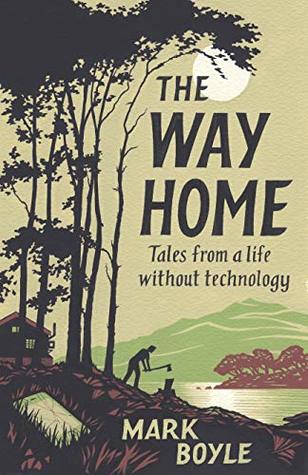
Mark Boyle’s previous experiment was to live without money for a year. He ended up living much longer than that, and it sent him down a path towards a new experiment: living without technology. The Way Home offers an intimate account of his life on a small farm in his native Ireland, where he chronicles his life without technology. Part Thoreau, part Gandhi, part Edward Abbey, this book is a wonderful journey that focuses not so much on the environmental destruction caused by modern culture, but on the effect that modern lifestyles have on us as people and on our relationship with the world. We know what is gained by technology, but what is lost?
If you like this book, you’ll also enjoy Mark Boyle’s 2011 TED talk about his relationship with money.
Collapse

What happens when a society outstrips its natural resources? Jared Diamond, legendary author of Guns, Germs, and Steel, takes a sweeping tour of the world to visit the societies that have collapsed in the distant past from Chaco Canyon to Easter Island to Greenland, and into recent times with the Rwandan genocide. He then analyzes our current state of resource overconsumption in a globalized world. As always, Diamond is incredibly detailed, with insights that cut through the fog of confusion that surrounds our modern predicament.
“Two types of choices seem to me to have been crucial in tipping the outcomes [of the various societies’ histories] towards success or failure: long-term planning and willingness to reconsider core values. On reflection we can also recognize the crucial role of these same two choices for the outcomes of our individual lives.”
“I have often asked myself, “What did the Easter Islander who cut down the last palm tree say while he was doing it?” Like modern loggers, did he shout “Jobs, not trees!”? Or: “Technology will solve our problems, never fear, we’ll find a substitute for wood”? Or: “We don’t have proof that there aren’t palms somewhere else on Easter, we need more research, your proposed ban on logging is premature and driven by fear-mongering”? Similar questions arise for every society that has inadvertently damaged its environment.”
Small Is Beautiful: Economics As If People Mattered
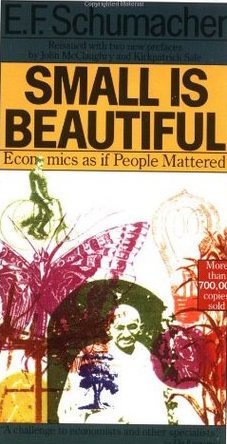
This classic asks a simple question: does our modern economy function in the interest of the average person? The obvious answer is that it does not. Schumacher outlines solutions and different ways of thinking about economics. This book is an antidote to the neoliberal economic policies of the world that have dominated since the time of Reagan and Thatcher, causing untold environmental and cultural destruction.
“Fossil fuels are merely a part of the “natural capital” which we steadfastly insist on treating as expendable, as if it were income, and by no means the most important part. If we squander our fossil fuels, we threaten civilisation; but if we squander the capital represented by living nature around us, we threaten life itself.”
The Limits To Growth
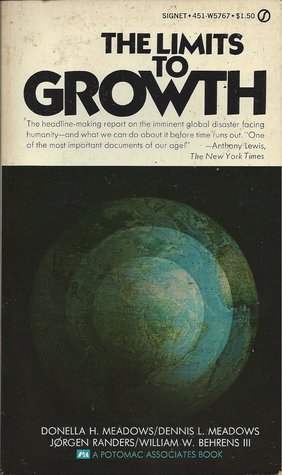
The message of this book still holds today: The earth’s interlocking resources – the global system of nature in which we all live – probably cannot support present rates of economic and population growth much beyond the year 2100, if that long, even with advanced technology. In the summer of 1970, an international team of researchers at the Massachusetts Institute of Technology began a study of the implications of continued worldwide growth. They examined the five basic factors that determine and, in their interactions, ultimately limit growth on this planet-population increase, agricultural production, nonrenewable resource depletion, industrial output, and pollution generation. The MIT team fed data on these five factors into a global computer model and then tested the behavior of the model under several sets of assumptions to determine alternative patterns for mankind’s future. The Limits to Growth is the nontechnical report of their findings. The book contains a message of hope, as well: Humans can create a society in which we can live indefinitely on earth if we impose limits on ourselves and our production of material goods to achieve a state of global equilibrium with population and production in carefully selected balance.
You can download a PDF version of The Limits To Growth from the main author’s website here.
“There are “50 simple things you can do to save the planet.” Buy an energy-efficient car, for one. Recycle your bottles and cans, vote knowledgeably in elections—if you are among those people in the world blessed with cars, bottles, cans, or elections. There are also not-so-simple things to do: Work out your own frugally elegant lifestyle, have at most two children, argue for higher prices on fossil energy (to encourage energy efficiency and stimulate development of renewable energy), work with love and partnership to help one family lift itself out of poverty, find your own “right livelihood,” care well for one piece of land, do whatever you can to oppose systems that oppress people or abuse the earth, run for election yourself.”
“People don’t need enormous cars; they need admiration and respect. They don’t need a constant stream of new clothes; they need to feel that others consider them to be attractive, and they need excitement and variety and beauty. People don’t need electronic entertainment; they need something interesting to occupy their minds and emotions. And so forth. Trying to fill real but nonmaterial needs-for identity, community, self-esteem, challenge, love, joy-with material things is to set up an unquenchable appetite for false solutions to never-satisfied longings. A society that allows itself to admit and articulate its nonmaterial human needs, and to find nonmaterial ways to satisfy them, world require much lower material and energy throughputs and would provide much higher levels of human fulfillment.”
Let My People Go Surfing
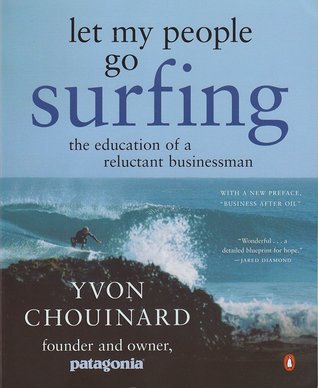
“The more you know, the less you need.”
“A master in the art of living draws no sharp distinction between his work and his play; his labor and his leisure; his mind and his body; his education and his recreation. He hardly knows which is which. He simply pursues his vision of excellence through whatever he is doing, and leaves others to determine whether he is working or playing. To himself, he always appears to be doing both.”
Yvon Chouinard is a legendary figure in the world of wilderness activities in the US. He invented a lot of modern rock climbing and mountaineering equipment, and funnels millions of dollars from his companies into environmental activism and protection. This is his book on business: how he went from being a climber forging carabiners in the back of his van in Yosemite Valley to founding the biggest companies producing equipment for the outdoors.
The Unsettling of America
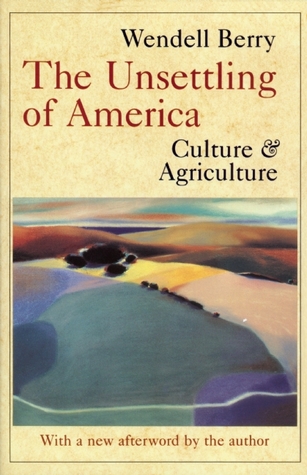
“We have given up the understanding — dropped it out of our language and so out of our thought — that we and our country create one another, depend on one another, are literally part of one another; that our land passes in and out of our bodies just as our bodies pass in and out of our land; that as we and our land are part of one another, so all who are living as neighbors here, human and plant and animal, are part of one another, and so cannot possibly flourish alone; that, therefore, our culture must be our response to our place, our culture and our place are images of each other and inseparable from each other, and so neither can be better than they other.”
Wendell Berry is a farmer and poet, outraged at what is happening with the spread of industrial agriculture. He details how our connection to the land is the definition of our culture, and how our industrial culture is killing both itself and the planet. If you read just one book about food, this should be it. Written over 50 years ago, Berry’s insight is still urgent and could have been written yesterday.
This Changes Everything: Capitalism vs. The Climate
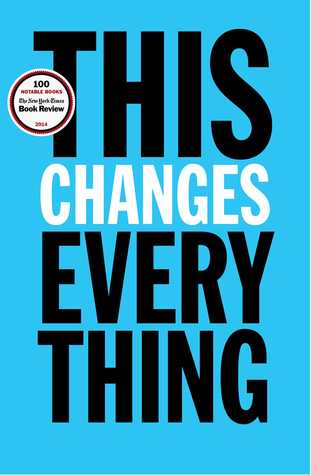
“What the climate needs to avoid collapse is a contraction in humanity’s use of resources; what our economic model demands to avoid collapse is unfettered expansion. Only one of these sets of rules can be changed, and it’s not the laws of nature.”
“Slavery wasn’t a crisis for British and American elites until abolitionism turned it into one. Racial discrimination wasn’t a crisis until the civil rights movement turned it into one. Sex discrimination wasn’t a crisis until feminism turned it into one. Apartheid wasn’t a crisis until the anti-apartheid movement turned it into one. In the very same way, if enough of us stop looking away and decide that climate change is a crisis worthy of Marshall Plan levels of response, then it will become one, and the political class will have to respond, both by making resources available and by bending the free market rules that have proven so pliable when elite interests are in peril.”
Why do we continue to “look away” from climate change, unable to acknowledge it as the crisis it truly is? Because the ideology and system of capitalism and its proponents—more specifically free-market fundamentalism aka neoliberalism—have systematically overpowered or silenced effective response. Its core policies of privatization, corporate deregulation, and lower corporate taxation are directly opposed to the policies needed to lower fossil fuel combustion. Addressing the climate crisis will call for tremendous economic and social change, not the false solutions offered by those same “disaster capitalists” (see her book The Shock Doctrine for more on this) who exploit social, economic, and now environmental upheavals to make themselves richer, or by geoengineers who assume the world is our resource to be used and manipulated without reciprocal stewardship or consequences. Importantly, though this crisis is urgent and disastrous, it’s also exciting and inspiring: this is a chance to create a society and economy that’s more equitable and compassionate, and the climate justice movement has already won several battles that are paving the way there. A book that will change the way you think about the reasons behind climate change and effective action going forward. (Also a documentary!)
The Abstract Wild
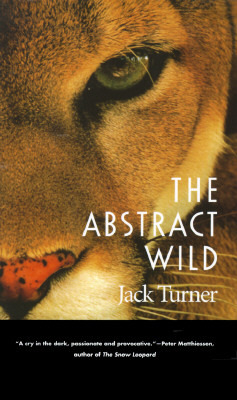
“Those early visits to the Maze, Glen Canyon, and the Escalante led me to the margins of the modern world, areas wild in the sense Thoreau meant when he said that in wildness is the preservation of the world: places where the land, the flora and fauna, the people, their culture, their language and arts were still ordered by energies and interests fundamentally their own, not by the homogenization and normalization of modern life.”
“[Wildness is] the relation of free, self-willed, and self-determinate ‘things’ with the harmonious order of the cosmos.”
“Something vast and old is vanishing and our rage should mirror that loss.”
In a collection of eight essays, Turner examines the questions: “how wild is wilderness and how wild are our experiences in it?” He argues—angrily, unapologetically—that the threats to wilderness have their root in six harmful abstract values and mindsets that shape our modern character and culture: 1) “our diminished personal experience of nature,” 2) “our preference for artifice,” 3) “our…dependence on experts to control and manipulate a natural world we no longer know,” 4) “our addiction to economics, recreation, and amusement at the expense of other values,” 5) a Western homogeneity and monoculture of biology, culture, language, thought, and social structures, and 6) an ignorance of or refusal to recognize the catastrophic loss of our “several-million-year-old intimacy with the natural world.” He calls for a change in character and in culture so we can reunited with the “life-force,” reborn as champions who confront the abstractions that keep the wild abstract from us.
Articles
Companies See Climate Change Hitting Their Bottom Lines in the Next 5 Years
“After analyzing submissions from 215 of the world’s 500 biggest corporations, CDP found that these companies potentially faced roughly $1 trillion in costs related to climate change in the decades ahead unless they took proactive steps to prepare. By the companies’ own estimates, a majority of those financial risks could start to materialize in the next five years or so.
The disclosures show how business leaders expect climate change, and the policy responses to it, to ripple through every corner of the global economy.
Many firms are bracing for direct impacts. Hitachi Ltd., a Japanese manufacturer, said that increased rainfall and flooding in Southeast Asia had the potential to knock out suppliers and that it was taking defensive measures as a result. Banco Santander Brasil, a large Brazilian bank, said increasingly severe droughts in the region might hurt the ability of borrowers to repay loans. Google’s parent company, Alphabet, Inc., noted that rising temperatures could increase the cost of cooling its energy-hungry data centers.”
Read the full article
How Big Business Is Hedging Against the Apocalypse
Investors are finally paying attention to climate change — though not in the way you might hope.
Global energy consumption is rocketing upward every year: The Energy Information Administration expects it to climb another 28 percent within a generation. Hydropower, wind and solar contribute about 22 percent of the total, and their share grows yearly. But the net amount of energy generated by hydrocarbons is growing yearly, too.
Unlike almost every other future event, climate change is 100 percent certain to happen. What we don’t know is everything else: where, or how, or when, or what the changes mean for Facebook or Pfizer or notes of Chinese-government debt. Navigating these thickets of complexity is theoretically what Wall Street excels at; the industry prides itself on its ability to price risk for the whole economy, to determine companies’ values based on their likelihood of generating earnings. But traders are compensated on their quarterly or yearly performance, not on their distant foresight.
What is odd about many of these climate plays, which rely on such complex assumptions about the future, is how myopic they seem. They assume that the world will change around a stable, fixed point. American weather will curdle to such a degree that Tennessee will become an incubator for malaria, yet Wall Street banks and patent lawyers will saunter along as usual. Rising oceans will submerge coastal financial centers beneath several feet of saltwater, yet commodities markets will pay top dollar for Greenlandic uranium. Taken individually, these assumptions sound dubious. But as a whole, they mirror what’s happening on Wall Street. Each successive year incinerates the temperature figures of the previous one, yet the stock market continues to break records.
Read the full article
The Tiny Swiss Company That Thinks It Can Help Stop Climate Change
Can two scientists from a Swiss firm called Climeworks perfect a novel process of “direct air capture” to remove CO2 from the atmosphere, bottle it, and store or sell it? Although Climeworks’s existing rooftop plant currently requires significant energy inputs to function, the two entrepreneurs (Christoph Gebald and Jan Wurzbacher) are finding ways to bring costs down and scale the size up. Right now they sell their expensive bottled CO2 to agriculture or beverage companies which seem willing to pay a premium for a vital ingredient they can use to help market their products as eco-friendly.
However, in the next seven years, Climeworks believes that it can bring expenses down to a level that would enable it to sell CO2 into more lucrative markets, like combining captured CO2 with hydrogen and fashioning many types of fossil-fuels. There is another company, Carbon Engineering, based in British Columbia, and backed by investors like Bill Gates, which is similarly seeking to produce synthetic fuel at large industrial plants from air-captured CO2. But eventually what Climeworks seeks to do once they lower costs and perfect the process is to pull vast amounts of CO2 out of the atmosphere and bury it, forever, deep underground, and sell that service as a carbon offset.
This fits Climework’s plan in a series of possible negative-emissions technologies (NETs), like planing new groves of trees, a process known as afforestation, which we can then burn for power generation, with the intention of capturing the power-plant emissions and pumping them underground, a process known as bioenergy with carbon capture and storage, or BECCS. Other negative emissions technologies including manipulating farmland soil or coastal wetlands so they will trap more atmospheric carbon and grinding up mineral formations so they will absorb CO2 more readily, a process known as “enhanced weathering.” As it happens, the Climeworks machines on the rooftop do the work each year of about 36,000 trees.
Read the full article
Neoliberalism has conned us into fighting climate change as individuals
“While we busy ourselves greening our personal lives, fossil fuel corporations are rendering these efforts irrelevant. The breakdown of carbon emissions since 1988? A hundred companies alone are responsible for an astonishing 71%. You tinker with those pens or that panel; they go on torching the planet.”
Read the full article
Films
The Moneyless Man
Mark Boyle is a well-spoken critic of the industrial capitalist system. Like a modern Henry David Thoreau, he set out to ask if it was possible to live outside of it. He offers valuable insight on the world of money in which we live. If you like this talk, you will love his 2019 book, The Way Home.
The Great Recycling Con
In this Video Op-Ed, the videomakers debunk a recycling myth that has lulled us into guilt-free consumption for decades.
This short film does a great job breaking down the mysterious world of recycling and the greenwashing surrounding the word “recycling”.
How To Be Rich, Happy, and Save The World
Pete Adeney (a.k.a. Mr. Money Mustache) does the math for people to show them how living within our means financially and cutting unnecessary consumption is a stepping stone to early retirement, happiness, and a better world. He’s an online finance blogger, but says:
“I don’t give a shit about your personal finances. What I care about is how much better a world we all get to live in if we become a little more rational with our money.”
“If you can get yourself financially independent, not only can you eliminate most of the bullshit from your life, but it forces your life’s work to become more truthful. Now this shit really matters. Because in the world today, there are people who grind away like little gears until they die, and then there are people who do pretty well for themselves but leave nothing more than a trail of conspicuous consumption: empty champagne bottles, depreciated luxury cars and yachts and vacation homes. And then there are people who leave a lasting difference. A society grows great only when the old people plant trees even though they know they won’t be around to enjoy the shade of those trees.”







